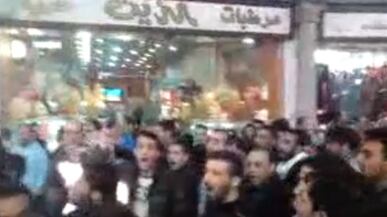On Wednesday afternoon, Syrian protesters are planning a sit-in at the Interior Ministry in Damascus to demand the release of all the country's political prisoners—and are bracing for a potentially violent government response. "Knowing the regime and having had to deal with it for so many years, I think they're going to be waiting for us," said "Mohamad," the brother of a political prisoner, who asked to use a pseudonym to guard against reprisal. "To fight us, to harass us, to beat us, and to try to stop us."
The protest stems from an amnesty decree issued by Syrian President Bashar al-Assad that had been anxiously anticipated by the country's scores of political prisoners and their families. In the wake of the pro-democracy upheaval sweeping the Arab world, they had hoped Assad might start dialing back the brutal totalitarianism that leads NGOs to consistently rank Syria among the world's worst human rights offenders.

Instead, the decree, handed down March 7, to mark the anniversary of the 1963 military coup that brought Assad's political party to power, pardoned people convicted of minor crimes like forgery—plus anyone over 70, which applied to a single, 80-year-old prisoner of conscience. "They're not taking seriously the emotion and sensitivity surrounding this issue," said Mohamad.
After the announcement, Mohamad was able to reach his brother for a brief phone conversation, during which he received word of a hunger strike being staged in prison. Inspired by the news, he and other family members of prisoners, along with veteran activists, began planning a way to show their support—by staging a rare public demonstration in Damascus. "We're not going to wait until we take our family members from prison to bury them," Mohamad said, speaking over Skype, with his cell phone turned off and the battery removed.
Inspired by revolutions in Tunisia and Egypt, young Syrians have taken to the web to promote their own, which led to a small demonstration in the capital Tuesday that was quickly dispersed by security forces. Yet in a country as repressive as Syria—where street protests have long been forbidden, the feared security police seem omnipresent, and memories still lingers from the massacres that followed the country's last spell of agitation in the 1980s—organizers say small and simple steps forward might be the best bet. The close ties between the family members of prisoners and their cause, meanwhile, could provide the right foundation from which to launch a lasting democracy push.
"It's very specific. It's very sensitive. It's very human. It's focusing on the families of political prisoners. People can identify with them," said an activist in Damascus involved with the movement.
"People are scared," says Mohammed al-Qahtani, the president of the Saudi Civil and Political Rights Association in Riyadh, where he is working with a similar group that's been mobilizing of late. "You need a committed group who want to change things due to the grievances they have. And I think the families of political detainees could do that."
After getting word of the hunger strike, Mohamad and the others began by trying to convince families of the imprisoned to sign onto the push. When the number topped 20, they made the call public and spread the word online, which Mohamad and others said has brought another 10 families on board. Around 200 people from around the country, they said, also have emailed pledges to join.
The numbers may seem small, but organizers hope the movement will appeal to regular Syrians as well. "It's very specific. It's very sensitive. It's very human. It's focusing on the families of political prisoners. People can identify with them," said an activist in Damascus who is involved with the movement.
They also hope it will show that it's possible to speak out. Razan Zeitouneh, a longtime and well-known activist in Damascus who has been helping to organize the demonstration, readily acknowledged that any public call to protest is bound to draw the ire of the regime and potentially keep most people inside. "The regime will bring all its force and military, and this will frighten a large number of people," she said. "But that wasn't the only purpose of this call. It's about breaking the fear and breaking the silence in Syria. And it's the start."
Mike Giglio is a reporter at Newsweek.






